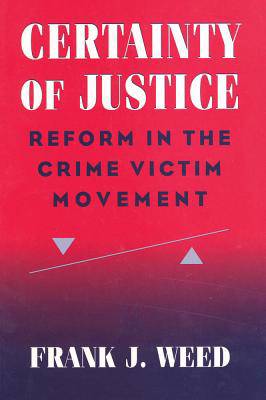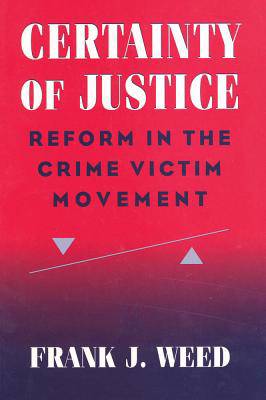
- Afhalen na 1 uur in een winkel met voorraad
- Gratis thuislevering in België vanaf € 30
- Ruim aanbod met 7 miljoen producten
- Afhalen na 1 uur in een winkel met voorraad
- Gratis thuislevering in België vanaf € 30
- Ruim aanbod met 7 miljoen producten
Certainty of Justice
Reform in the Crime Victim Movement
Omschrijving
Under the banner of rights of crime victims, a social movement that started in the late 1970s now promotes new laws and social services in the victims' behalf. Like many previous American reform movements, this one is diverse, sometimes reactionary, filled with borrowed ideas, and permeated with self-serving elements. It has already changed our concept of justice, by defining a role for crime victims (and their family members) beyond the evidentiary need of the prosecution in a court of law. It demands that the law, standing in for society as a whole, use its authority to demonstrate the triumph of good over evil rather than to bear out the bureaucratic process.
Weed portrays the victims' rights movement as having developed out of a confluence of very different agendas for social action: the national conservative crusade for law and order on one side, and the feminist movement's concern with violent crimes against women on the other. As the movement has gained momentum it has acquired a complex organizational system of national centers and grass roots groups.
Certainty of Justice takes an inside look at this system - at some of the people who run these groups, and at the issues promoted by their agenda. It also examines some of the consequences of the work of the movement, reflected in recent changes in state and federal laws enacted and decisions rendered in the name of "victims' rights."
Specificaties
Betrokkenen
- Uitgeverij:
Inhoud
- Aantal bladzijden:
- 158
- Taal:
- Engels
- Reeks:
Eigenschappen
- Productcode (EAN):
- 9780202305189
- Verschijningsdatum:
- 2/01/1996
- Uitvoering:
- Paperback
- Formaat:
- Trade paperback (VS)
- Afmetingen:
- 153 mm x 228 mm
- Gewicht:
- 240 g

Alleen bij Standaard Boekhandel
Beoordelingen
We publiceren alleen reviews die voldoen aan de voorwaarden voor reviews. Bekijk onze voorwaarden voor reviews.










